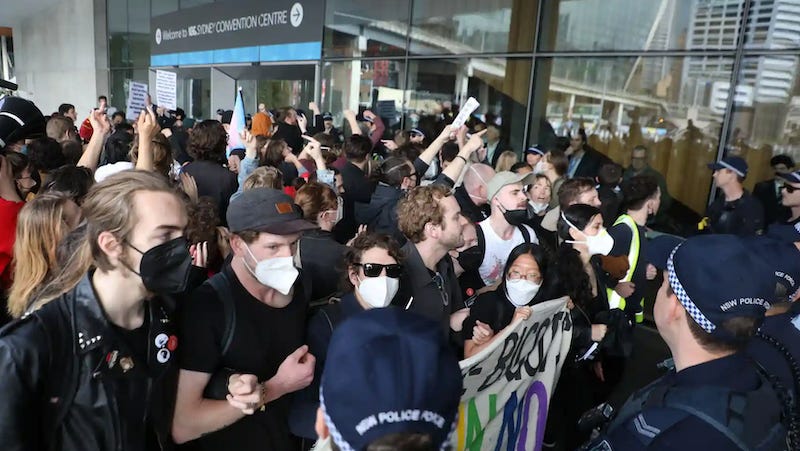The Week in Politics: CPAC culture of complaint, the Frontier Wars, and Liz Truss does Labor a big tax favour
The Conservative Political Action Conference rolled into Sydney last week, and it’s an extreme libertarian group who are maniacally angry, loud, abrasive, in-your-face, and filled with endless complaints about everything in their sights.
A culture of complaint but without any solutions and without any responsibilities. They’re anti-socialist, anti-woke, anti-republic, anti-cancel culture. What are they actually for? Is there anything positive in their agenda? No, absolutely not. It’s destructive, not constructive. These are cashed-up babies who never really grew up and are suffering from arrested development. Sure, there are the fools on all sides of politics, but this chapter of CPAC is on a special level of its own.
Should the CPAC be left to its own devices and wither away? Every argument they put forward can be easily rebutted, but they’re supported by the wealth class, who are only too happy to fund this level of unhinged stupidity to sway opinions in the electorate. As special CPAC guest, Nigel Farage, managed to do with Brexit – he extracted Britain from the European Union, and left it teetering on the edge of disaster and obscurity.
And in the same way Australian conservatives embraced Lord Monckton in the early 2010s to manufacture anger against Labor’s carbon pricing mechanism, yet another failed British reject is sent off to antipodes to spread his own brand of lies, racism, classism and hate.
This nihilistic agenda has to be pushed back at every opportunity.
The Frontier Wars
The Australian War Memorial has announced that it will expand the recognition of the different frontier wars that occurred in Australia – and they were the conflicts between white settlers and police on one side, and Indigenous people – and this is after sustained criticism over many years that the War Memorial mainly focussed its attention on overseas wars and totally ignored the wars against Indigenous people that commenced a few months after European settlement or invasion in 1788, and lasted until the 1930s.
And much of this has been documented – there were the Hawkesbury and Nepean Wars, the Bathurst War, there was the Black Wars in Tasmania, Battle of Pinjarra, the battles in the Kimberley region – and there’s many more that have been documented as well – and at least 40,000 Indigenous people died, and around 3000 settlers.
And the effects of these frontiers wars and violence are still affecting Indigenous people, a treaty or a formal end to these wars had never been made – most people aren’t aware of the details of these frontier wars – there’s still more that needs to be done in this space, but the Australian War Memorial expanding this knowledge to the general public is a good start.
Liz Truss and Tax Lessons for Labor
We don’t usually comment on British politics, but the new British Prime Minister, Liz Truss, may have just done the Australian Labor Party a huge favour, and that was when she announced that she was going to provide a tax cut for high income earners in the UK – abolishing the tax rate of 45% for incomes over £150,000.
It’s safe to say that not very many people were happy with this decision – the British pound dropped dramatically, there was a revolt within the Conservative Party, and there was a political backlash within the British electorate, which resulted in opinions polls showing 54 per cent support for the British Labour Party, and just 21 per cent support for the Tories.
Abolishing the top tax rate meant that people earning over £150,000 would be paying 40 per cent in tax, so it’s not a major adjustment, but that’s the revolt that occurred by dropping the highest tax bracket by 5 per cent.
The Stage 3 tax cuts, which are supposedly coming in at the beginning of the 2024/25 tax years, propose remove the 37 per cent tax band, and just having the 32.5 per cent tax band for incomes between $45,000 and $200,000 – so it’s a different type of tax cut, but it’s still significant, and actually worse than what the UK proposed – Prime Minister Anthony Albanese and the Labor government are starting to face a lot of pressure over the Stage 3 tax cuts, even though it’s not their policy – but should they looking at what’s happening in the UK to guide their decision making?
We wish Albanese was less cautious – the big tactical error of Barack Obama was he spent the first two years being cautious when he had control of both Houses of Parliament – Congress and the Senate. And he could have done a lot more but he defends this in his autobiography by suggesting change affected by a black President is a lot different to change affected by white President.
Albanese doesn’t have those types of issues here and it would be better if he’d be a little bit less cautious, more headstrong, and implement his agenda while he’s got the opportunity. He’s got a new government and ministers who have to learn the ropes, but there’s a time to be cautious and to be seen to be cautious – and there’s a time to crash through or crash.





